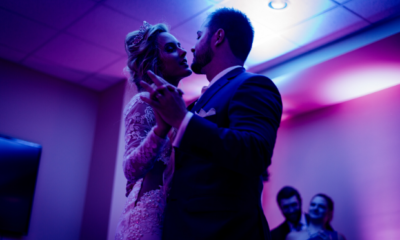Life
How You Know You Are A Hopeless Romantic Just Like Me

I figured out recently that I’m nothing more than a hopeless romantic. When you’re single, you learn things about yourself that you’d forgotten. This is one of those points for me. Hopeless romantics like me are nothing more than dreamers who want the world to be awesome.
Who doesn’t want to be in love with love? Love can bring you more magic than any form of money or achievement can. Love is the secret ingredient to happiness, and that’s why I think I’m a hopeless romantic. In the end, I just want people to be awesome to each other and have the time of their lives.
We only get one shot so why not do it in a classy way with our best friend love? There are 7 signs that you are a hopeless romantic like me and here they are:
1. You think about your dream partner all the time
As a hopeless romantic you often find yourself in quiet moments daydreaming about your dream partner who doesn’t even know you like them yet. You are obsessed with the idea of being with this person, and you have thoughts of experiencing phenomenal places together.
You think about traveling with them and realise how much better overseas can be when you share it with someone else. Going around the world by yourself is only fun for so long. Eventually, you have to wake the hell up and understand what real success is.
Sometimes, you wake up in the middle of the night fantasising about the way they make you feel, and you swear that if you ever get the chance, you’ll finally take the plunge like all of your other friends.
2. You enjoy fireplaces
Put on any good romantic movie, and there is a strong chance of a fireplace being present. Us hopeless romantics seem to be drawn to the smell of charcoal and the heat that a fireplace gives us. Even when we go to the local market, and they are char grilling a pig, we’re reminded of a fireplace.
You secretly long to be curled up on the slopes of a ski resort with that special someone, drying off after a long day of skiing. What’s even more bizarre is that when you meditate, you become strangely addicted to the session that asks you to picture yourself being next to a fireplace with an orange pillow. You’re not weird; you’re just a hopeless romantic like me.
3. Long walks are fun to you
In modern society, the last thing most people want to do is exercise because TV and junk food is a much easier way to ease yourself out of the pain of not living your purpose. Not you, though. You love long walks because it reminds you of what you want to do with your dream partner.
Long walks equal time to tell a story from your childhood or inspire your significant other to take the plunge and change their career. Long walks to a hopeless romantic equal time out from the rat race to dream of a life where entrepreneurship and creativity dominate.
A life where you can spend a lot of your time with your partner and making them happy. You don’t hate long walks like everyone else because you’re a hopeless romantic who wants to get outside and live life. Walking from one side of the beach to the other after you have finished kite surfing is fun to you (side note I am becoming a hopeless kite surfer too so maybe ignore this fact).
4. You smile a lot
Aside from long walks, you find yourself smiling a lot for no reason at all! You know you’re a hopeless romantic like me when you smile a lot because your reason for smiling is different to everybody else. You smile at everyone because you believe that the other person on the receiving end of your smile may be the long lost partner you’ve been looking for all your life.
The act of a smile is really just an insecure way to tell people that you hope they can see something in you that others haven’t seen yet. The smile is nothing more than a cry for love, attention, and significance. If only people knew why you smiled.
If only they knew what was behind the smile, then they would truly understand you.
5. You write out speeches
Now if you’re about to go and meet “the one” then you know you’re a hopeless romantic like me when you write out what you’re going to say. Non-hopeless romantics are probably wondering why the heck we would do this.
The answer is only something that a hopeless romantic like me would understand; we want to say what we truly feel without messing it up. It’s not so much a drive for perfectionism but rather a fulfillment of a dream that we’ve waited so long to achieve. A dream we sometimes thought was impossible.
When you’re given a chance to make a dream come true, practice and dedication is never a bad thing. It’s just what us hopeless romantics do, and we’re okay to be viewed as tragic for it.
6. You love cooking
As a hopeless romantic in the world of home delivery food, you probably love cooking like me. I’m the worst cook ever, but when you add romance into the equation, I become like Jamie Oliver and cook up a storm.
It’s something about those herbs and spices, mixed with romantic glances towards the person you want to marry one day, which make you crazy with food. Don’t fight it, embrace it!
7. You get tongue-tied when you meet the one
At that moment in time when you meet “the one,” you know you’re a hopeless romantic like me because you get tongue-tied and can’t speak. Even though communicating well is something you’ve always been very good at, us hopeless romantics all of a sudden find a new sense of fear.
It happens because we have craved this moment of love for so long. Unlike our friends, we don’t want this person ever to let go of us because we’ve achieved our dream of happiness. We want the moment to last forever, and this stops our mouth and tongue from moving correctly and saying stupid stuff that we’ve never said before.
***Final Thought***
Forget about what those supposed cool startup founders that work twenty hours a day are telling you; you should strive to be a hopeless romantic. You’ll never be really happy unless you spend some amount of time with a person that you love above everything else.
Love is success above everything else that we talk about on Addicted2Success. Love is what makes a business do a billion dollars in revenue, and it’s what makes us achieve our dreams to change the world. Don’t get caught up in the hype of success and strip it back to the basics every once in awhile.
Are you a hopeless romantic like me? Maybe you don’t know it yet. Let me know if you are on my website timdenning.net or my Facebook.
Life
Imposter Syndrome Is Rooted in Your Past But Here’s How You Can Rewire It
Imposter syndrome is most prevalent in highly successful women

Imposter syndrome is “the persistent inability to believe that one’s success is deserved or has been legitimately achieved as a result of one’s own efforts or skills.” (more…)
Life
The Surprising Mental Health Tool You Probably Haven’t Tried
Through journaling, I arrived at a more balanced perspective, it reinstated my sense of gratitude and led me to accept my disability

In two particularly difficult times in my adult life, my journaling practice is helping me heal emotionally. It has been a vital tool for helping me see the bigger picture and land in a place of gratitude. (more…)
Life
How to Stop Comparing Yourself to Others and Find True Happiness
Comparison is the thief of joy; it robs us of our happiness, self-esteem, and peace of mind

In today’s hyperconnected world, it’s easier than ever to fall into the trap of comparing ourselves to others. Social media platforms like Instagram, Facebook, and LinkedIn constantly bombard us with curated highlights of other people’s lives, making it seem like everyone else is happier, more successful, and more fulfilled than we are. (more…)
Life
Harness the ‘Battery Effect’ to Transform Life’s Tensions into Your Greatest Strength
Recharge your life batteries by shifting your mindset today

I believe our life capacity is determined by the skillsets we develop on this spinning rock we call Earth. By “life capacity,” I mean our ability to embrace and sustain joy. (more…)
-

 Did You Know4 weeks ago
Did You Know4 weeks ago7 Surprising Life Lessons Video Games Taught Me That School Never Did
-

 Success Advice4 weeks ago
Success Advice4 weeks agoHow Playing by the Rules Became the Smartest Business Strategy
-

 Success Advice3 weeks ago
Success Advice3 weeks agoHow to Build Trust, Kill Micromanagement, and Lead a Team That Thrives
-

 Success Advice3 weeks ago
Success Advice3 weeks agoSuccess Isn’t Sexy: 5 Daily Habits That Actually Work
-

 Scale Your Business3 weeks ago
Scale Your Business3 weeks agoHow to Build a Workplace People Actually Want to Show Up To
-

 Scale Your Business3 weeks ago
Scale Your Business3 weeks agoHow Smart Entrepreneurs Cut Financial Chaos in Half with One Simple Switch
-

 Success Advice3 weeks ago
Success Advice3 weeks agoBreaking the Bias: How Females Can Thrive In The Workplace in 2025
-

 Scale Your Business3 weeks ago
Scale Your Business3 weeks agoThis Is How Successful Entrepreneurs Manage Their Time Differently


























2 Comments